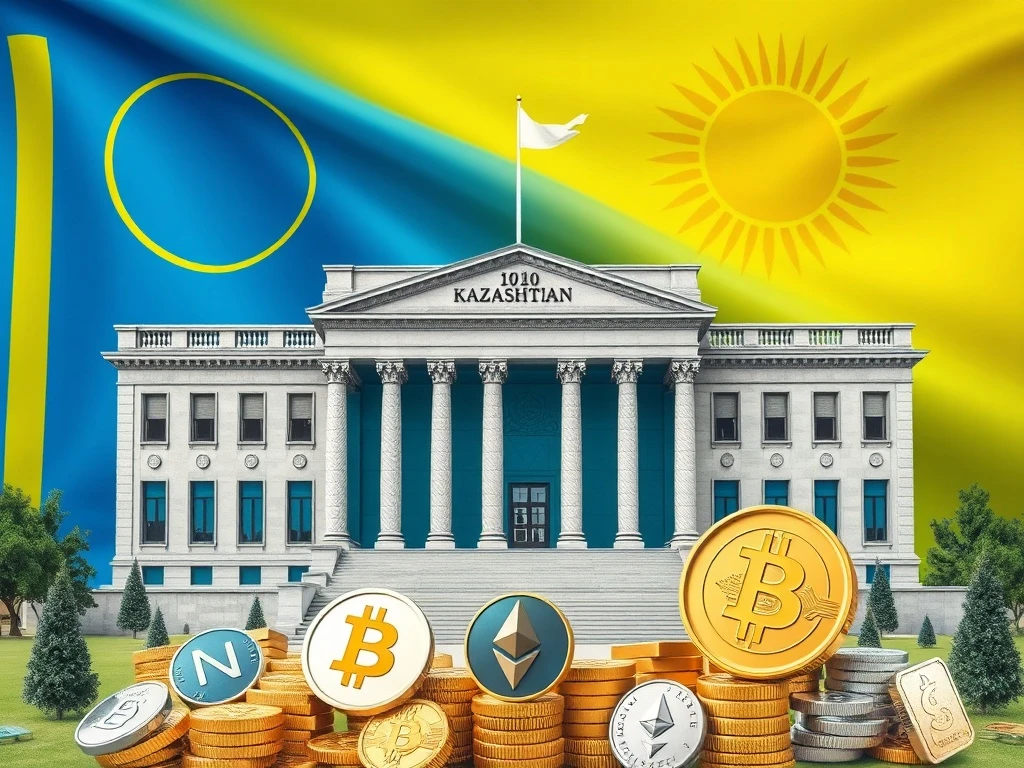Kazakhstan Reveals Bold Plan: State Wealth Fund Eyes Crypto Investment

Get ready for some potentially big news from Central Asia! Kazakhstan is making waves in the digital asset space, with reports indicating that the country’s massive sovereign wealth fund and national reserves are eyeing significant crypto investment. This move signals a growing acceptance of cryptocurrencies at the highest levels of government finance.
Why is Kazakhstan Exploring Sovereign Wealth Fund Crypto?
Kazakhstan’s central bank, led by Timur Suleimenov, is reportedly looking at more ‘aggressive strategies’ to boost investment income. Drawing inspiration from countries like Norway, the United States, and initiatives in the Middle East, the central bank sees cryptocurrencies as a viable asset class. These nations have already made strides in digital assets, either directly or through related financial instruments like ETFs.
The primary driver appears to be the potential for higher returns compared to traditional assets. By allocating a portion of the nation’s wealth and reserves to crypto, Kazakhstan hopes to enhance its financial standing in the long term. This isn’t entirely new; Suleimenov had previously mentioned plans for a national crypto reserve.
How Might State Reserves Crypto Investment Work?
According to reports citing Timur Suleimenov, the plan involves potentially investing a part of Kazakhstan’s gold and foreign exchange reserves, alongside assets from the sovereign wealth fund, into crypto-related instruments. This could include:
- Direct investments in major cryptocurrencies.
- Investments in crypto-focused Exchange-Traded Funds (ETFs).
- Holding shares in companies closely tied to the crypto industry.
Furthermore, Kazakhstan aims to build a national crypto asset reserve using digital assets confiscated by law enforcement. This multi-pronged approach highlights a comprehensive strategy for integrating digital assets into the nation’s financial framework.
What is Kazakhstan’s Broader Central Bank Crypto Strategy?
This potential move into state reserves crypto investment is part of a larger push by Kazakhstan to become a leader in the regional digital asset space. The country has been actively developing its crypto infrastructure and regulatory environment.
Recent initiatives include the launch of a pilot zone for digital asset payments and broader adoption. This builds on the introduction of the digital Tenge, Kazakhstan’s central bank digital currency (CBDC), rolled out in November 2023. Digital Development Minister Kanysh Tuleushin has expressed the nation’s ambition to be Central Asia’s primary crypto hub.
The Current State of Crypto Investment Adoption in Kazakhstan
Despite the government’s strong regulatory and infrastructure efforts, crypto adoption at the local or retail level in Kazakhstan remains relatively low compared to many other countries. According to the Chainalysis 2024 Global Crypto Adoption Index, Kazakhstan ranked 57th out of 151 countries. This suggests a disconnect between top-down government initiatives and grassroots adoption.
While the government is actively exploring large-scale crypto investment and infrastructure, encouraging widespread public adoption presents a separate challenge that the country is still navigating.
Looking Ahead: What Does This Mean for Kazakhstan Crypto?
The reported plan for the sovereign wealth fund and state reserves to invest in crypto is a significant development. It signals a serious commitment from Kazakhstan to digital assets and positions the country as a potential early adopter among nations looking to diversify their national wealth holdings into this new asset class.
Learning from the experiences of Norway, the US, and the Middle East provides a framework for Kazakhstan’s central bank crypto strategy. While retail adoption still lags, the government’s focus on large-scale crypto investment and infrastructure development could pave the way for future growth and solidify Kazakhstan’s position as a regional player in the global crypto market.
In summary, Kazakhstan is charting a bold course, exploring the inclusion of crypto in its national wealth and reserves. This strategic move, driven by the pursuit of higher returns and inspired by international examples, marks a pivotal moment in the country’s embrace of digital finance, even as it works to boost adoption among its population.










